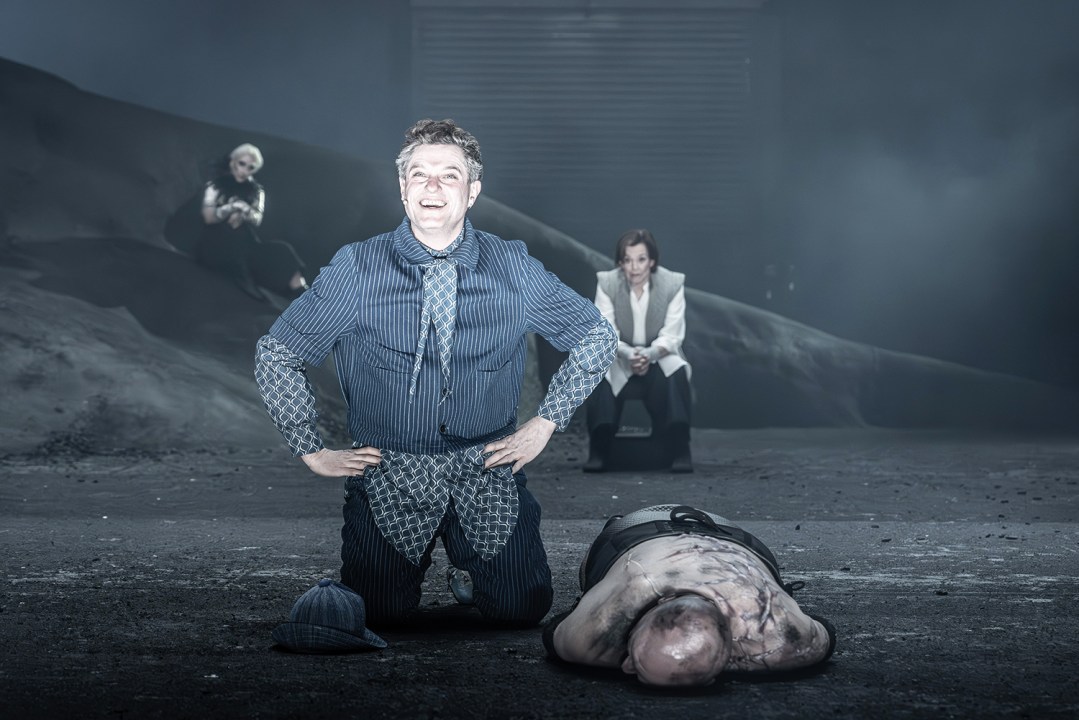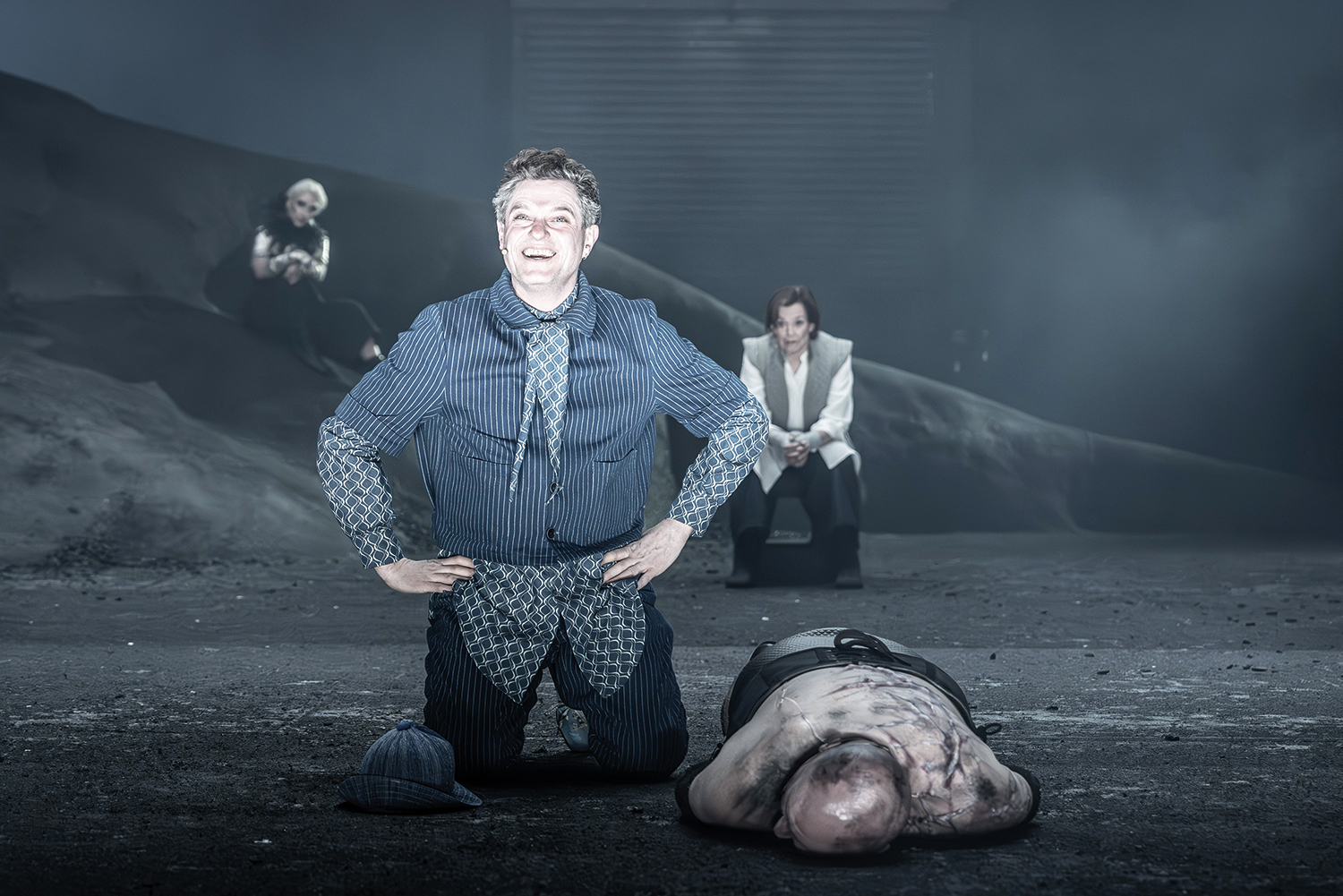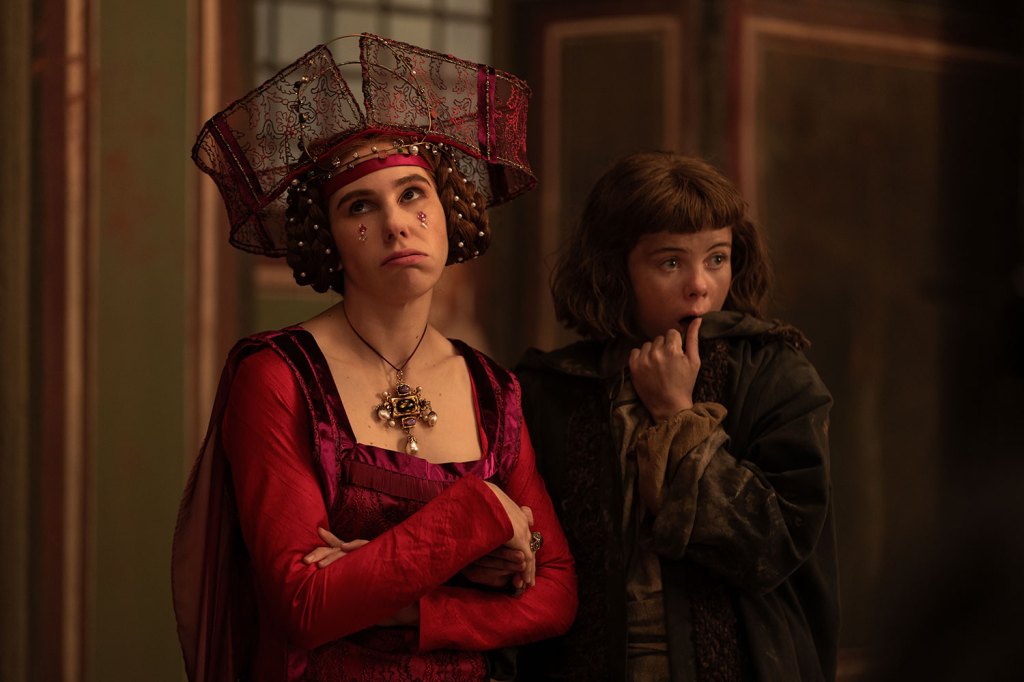
The Tempest is Shakespeare’s farewell, his final masterpiece or, if you’re being cynical, the play that made him jack it all in. Some actors admit that it can be hard to stage and dull to perform. What is it exactly? A children’s fairy tale and a soppy romance with snatches of drunken farce and political intrigue. Quite a muddle. The setting is famously eccentric. Shakespeare whisks the audience away from reality and drops them in a magical kingdom where a sanctimonious wizard rules over a population of goblins and fairies.
The overbearing soundtrack keeps coming up with new ways to irritate your eardrums
Some directors try to correct the Bard by turning Prospero’s island into an even weirder and less familiar realm. This bad idea has been adopted by Jamie Lloyd in his cheerless version starring Sigourney Weaver. He locates the action in a shadowy moonscape that looks like a gravel-pit or a cheap Doctor Who set from the 1970s. Or is it a helipad on a fog-bound Scottish peninsula? That might explain the swirling mists and the banks of spotlight that cut sharply through the gloom. There’s plenty to look at here, and plenty to listen to as well. The overbearing soundtrack keeps coming up with new ways to irritate your eardrums. Huge loudspeakers linked to the actors’ microphones send the dialogue booming out across the venue like safety announcements on a stalled train.
Weaver plays Prospero as a non-binary chief executive with numerous titles. She doesn’t mind if she’s addressed as ‘lady’, ‘mother’, ‘duchess’, ‘prince’, or ‘lord’. Weaver has plenty of charisma and her clothes are nicely tailored: a gorgeous white shirt, a chunky grey waistcoat and fingerless gloves. She looks like a retired barrister selling cheese at a farmers’ market. Ariel (Mason Alexander Park) seems to be in a separate show, a Las Vegas residency perhaps, with his own lighting and costume designer. If his plan is to copy Marc Almond he succeeds, but he doesn’t belong in this play. He appears out of nowhere, singing or speaking his lines, and then melts into the darkness. Occasionally he gives us a tune while dangling in mid-air from wires that aren’t as invisible as they might be.
Forbes Masson delivers a grotesque and embittered Caliban who snarls out the script in an aggressive Scots accent. Audaciously stripped to the waist, Masson wears an elasticated black truss around his midriff which he matches with Batman’s underpants. He lives in an igloo made of soot. The show’s big heartthrob, James Phoon (Ferdinand), appears in a pair of white pixie boots, sky-blue pantaloons and a bomber jacket with too many buttons. Like most of the cast, his performance is overwhelmed by the camp, fussy detailing of his costume. The supporting players are kitted out in a variety of capes, waistcoats, swirly cravats or knitted jerkins, and they look as if they’re auditioning for a musical about the life of Cat Stevens. The only point of light is Mathew Horne, who plays Trinculo as an adorably cuddly twerp. He’s brilliant. If the show reaches Broadway, this role will make Horne’s name as a light comedian in America.
Tarantula is a new monologue by Philip Ridley set in present-day Bethnal Green. The narrator, Toni, is a highly literate teenager who meets a charmingly awkward boy, Michael. On their first date they eat at McDonald’s and then sneak around the back to Weavers Fields, a park of questionable reputation, where Michael is stabbed to death by a local hoodlum. Toni is so severely injured that she loses a kidney.
This appalling crime – a murder and an attempted murder – is mysteriously covered up by all concerned. Toni’s mum begs her not to identify the killer. The police do nothing. The security footage vanishes. No witnesses come forward. Every media outlet ignores the story. The local MP fails to show any interest in an atrocity that takes place less than half a mile from her constituency office.
It’s never explained how such a junior criminal is able to exert so much power over the police
To ensure Toni’s continued silence, she and her family are subjected to a campaign of intimidation. Excrement on the doorstep. Bricks through the window. Coded warnings left in Toni’s baby sister’s pram. Eventually they cave in and quit the East End for good.
But the strangest part of this story is that the killer is a teenage boy. It’s never explained how such a junior criminal is able to exert so much power over the police, the media and the politicians. The story feels incomplete.
After escaping from her youthful tormentor, Toni starts a new life as an aerobics instructor. She turns into a lesbian as well, of course, and she makes lots of new friends. Which is nice for her – but boring for us. The expected showdown with her tormentor never comes. A strange play. It feels like a pitch for a movie that no one wants to produce.








Comments